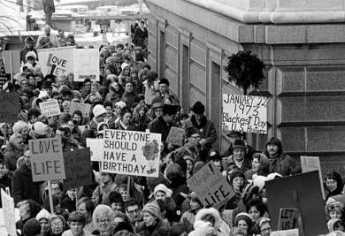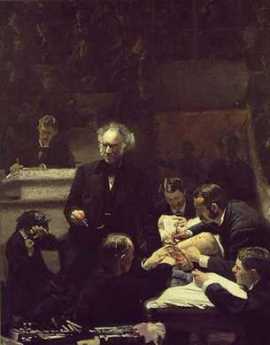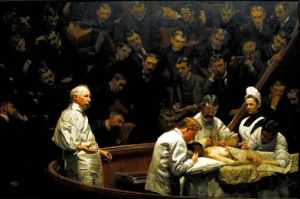Related Topics
Philadelphia Medicine
The first hospital, the first medical school, the first medical society, and abundant Civil War casualties, all combined to establish the most important medical center in the country. It's still the second largest industry in the city.
...Ratification, Bill of Rights and Other Amendments
The 1787 Constitution lacked a Bill of Rights. Few except Madison himself were opposed to adding one, but many other delegates would have failed election without promising it. Negotiations at the Convention had proved so excitingly innovative that time ran out before the Convention had to adjourn with only a promise of a Bill of Rights, first thing.
Medical Economics
Some Philadelphia physicians are contributors to current national debates on the financing of medical care.
Favorite Reflections
 In no particular order, here are the author's own favorites.
In no particular order, here are the author's own favorites.
Reminiscences
"The past is never dead. It's not even past." -- William Faulkner, Requiem for a Nun
Lumpers, Splitters and Technicians: The Framers of the American Constitution
 Half a dozen distinguished colonists came to believe the thirteen American colonies could not survive unless they banded together. Eight years of bitter experiences during the Revolutionary War had taught them they must unite. We might call them lumpers.
Half a dozen distinguished colonists came to believe the thirteen American colonies could not survive unless they banded together. Eight years of bitter experiences during the Revolutionary War had taught them they must unite. We might call them lumpers.
Abortion
The official position of the Pennsylvania Medical Society on the topic of abortion is, we have no position on abortion. I ought to know because I was the author of this position, proposed at a moment when the PA Medical House of Delegates was obviously going nowhere. After two hours of angry debate, we had to stop before we split into two warring medical societies. The Pennsylvania delegation to the AMA was then obliged to hold the same no-position on a national level. As I recall, our position was likewise greeted by the AMA House of Delegates with great relief, and word quickly circulated in the corridors that Pennsylvania had a position everyone could endorse for the good of the organization. For several years, this no-position position was widely referred to whenever the topic threatened to arise. It almost invariably stopped the discussion in its tracks, as it was intended to do. In going back over the minutes, it would appear the AMA never actually voted to adopt a no-position motion, a discovery that surprised but did not change the basic determination to let the rest of the nation settle this. We were going to stay out of it.

|
| Roe vs. Wade |
Because, one hundred forty years earlier, we started it. If you actually read Justice Blackmun's opinion for the majority in Roe v. Wade, as very few agitated proponents seem to have done, the original medical origin is clearly laid out. Blackmun had been a lawyer for the Mayo Clinic before his appointment to the Supreme Court, acquiring unusual medical resources and experiences for a lawyer. Now prepare for a logical leap, to the The Gross Clinic, Thomas Eakins masterpiece painting of Philadelphia's pre-eminent surgeon in a black frock coat, holding a dripping crimson scalpel in his bare hand, encapsulates the original situation. Note carefully that anesthesia is being given to the patient, but the surgeon is not wearing a cap, mask, gown, or rubber gloves.

|
| Gross Clinic |
In 1850 medical science had progressed into a forty-year time window when anesthesia made abortions painless, but Pasteur had still not identified bacteria, and Lister had not devised a way to cope with them. Abortions, common in ancient Greece but forbidden by Hippocrates, suddenly were widely demanded by 19th Century women in a situation when their judgment was vulnerable. Abortions were easy to do, all right, but women died like flies from the resulting infections, and the American Medical Association was distraught about it. The Oath of Hippocrates was brought forward to emphasize its prohibition of abortion, and the performance was made unethical for a member of the Association, sufficient cause to warrant expulsion. When that proved inadequate, the delegates agreed to go to their local state legislatures and seek legislation prohibiting the performance of abortion by anyone, member or non-member of the Association. These laws were quickly passed, and it was the Texas version which was overturned by Roe v. Wade as an unconstitutional denial of privacy. Roe was a pseudonym for the patient, and Wade was then Attorney General of Texas, the officer charged with enforcing Texas law. By 1900 abortions became both easy and safe for the mother, and by 1911 the AMA had reversed its position. The scientific surgical situation is well illustrated by a later famous painting about Philadelphia surgery by Thomas Eakins, the Agnew Clinic, in which the surgical team is portrayed in its modern costume of sterile gowns and rubber gloves. But it didn't matter since by that time various churches had hardened their doctrines. Religious leaders and their constituent politicians simply no longer cared what the medical profession thought about it. For at least the following century, ideological combatants were plainly only interested in whether physician opinion might advance one side or the other of their argument with useful official statements. Our real position, if anyone cares, is that we started out seeking protection for the safety of the mother, but the issue got twisted by others into disputes about the welfare of the unborn fetus.

|
| Agnew Clinic |
Since this is the case, there plainly may be a reason for state legislatures to reconsider the state laws they passed in the 19th Century, during that forty-year window of time when the scientific facts were in transition. But when a leap is made by the appointed referees of the federal government to overturn state laws, even about a basically medical issue, there has to be some legal reason to intervene; a medical reason somehow doesn't count. Justice Blackmun's discovery of an unnoticed right to "privacy" in the Constitution, where the word does not appear, is just too hard for us non-lawyers to deal with. Suppose we leave the fine points of the Bill of Rights to those constitutional lawyers. What's at stake here, among other things, of course, is whether the Federal Courts are justified in overturning well-intentioned state laws which had served well for at least fifty years -- simply out of impatience with the sluggishness and political timidness of state legislatures to revise obsolete laws. That's unbalancing the Constitution for a comparatively minor cause. Even major cause is something we have agreed to adjust in other ways, by amendment, not judicial opinion. And that's my opinion, having comparatively little to do with abortion.
Originally published: Friday, June 23, 2006; most-recently modified: Wednesday, May 22, 2019